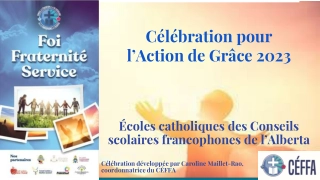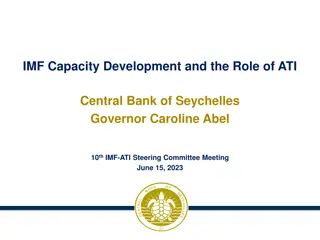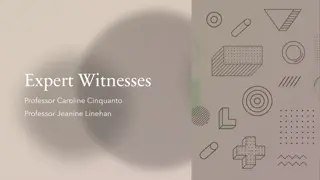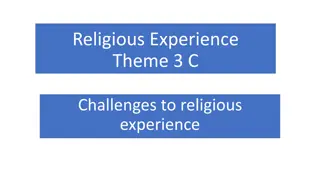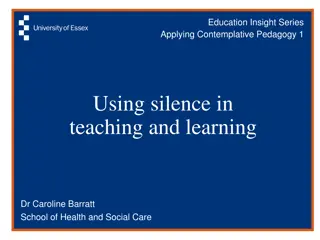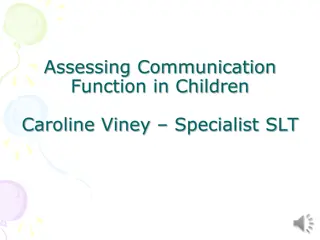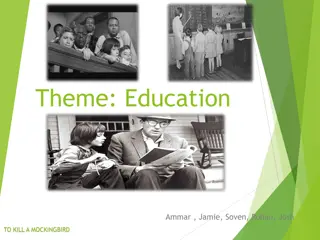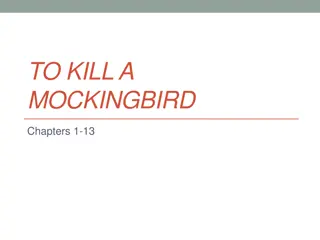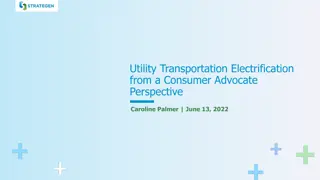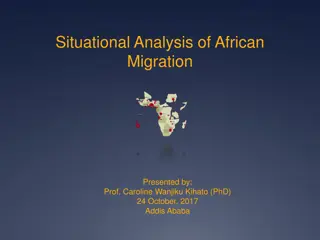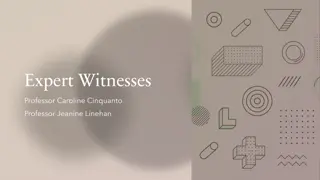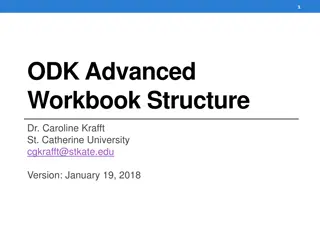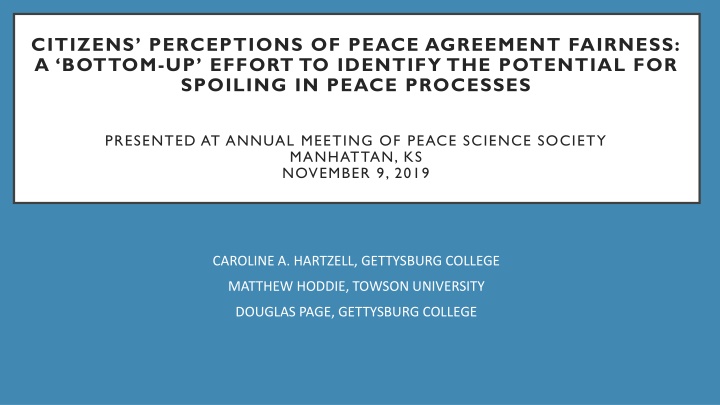
Citizens' Perception of Peace Agreement Fairness and Spoiling Behavior
Explore the relationship between citizens' perceptions of peace agreement fairness and the potential for spoiling behavior in peace processes. Understand the implications, case studies, and insights related to citizens' reactions to peace agreements based on fairness. Theoretical frameworks and empirical evidence are discussed to shed light on this important aspect of peacebuilding efforts.
Download Presentation

Please find below an Image/Link to download the presentation.
The content on the website is provided AS IS for your information and personal use only. It may not be sold, licensed, or shared on other websites without obtaining consent from the author. If you encounter any issues during the download, it is possible that the publisher has removed the file from their server.
You are allowed to download the files provided on this website for personal or commercial use, subject to the condition that they are used lawfully. All files are the property of their respective owners.
The content on the website is provided AS IS for your information and personal use only. It may not be sold, licensed, or shared on other websites without obtaining consent from the author.
E N D
Presentation Transcript
CITIZENS PERCEPTIONS OF PEACE AGREEMENT FAIRNESS: A BOTTOM-UP EFFORT TO IDENTIFY THE POTENTIAL FOR SPOILING IN PEACE PROCESSES PRESENTED AT ANNUAL MEETING OF PEACE SCIENCE SOCIETY MANHATTAN, KS NOVEMBER 9, 2019 CAROLINE A. HARTZELL, GETTYSBURG COLLEGE MATTHEW HODDIE, TOWSON UNIVERSITY DOUGLAS PAGE, GETTYSBURG COLLEGE
WHY FOCUS ON CITIZENS PERCEPTIONS OF PEACE AGREEMENT FAIRNESS IN RELATION TO SPOILER BEHAVIOR? Citizens support for peace agreements can have implications for the peace: In democracies, through referendum (e.g. Colombia in 2016); Willingness to countenance and support a return to use of violence . Potential for peace agreement provisions to influence behavior: Peace agreement provisions have been found to affect peace duration (Hartzell & Hoddie 2007; Mattes and Savun 2009), suggesting provisions can influence actors commitment to the peace. Fairness a plausible means of assessing citizens reactions to the contents of a peace agreement, particularly in divided societies: Tellez observes that as a framework for decisionmaking [regarding the different dimensions of a peace agreement], fairness is simpler and more immediate than other criteria .
THE CASE FOR A FOCUS ON CITIZENS PERCEPTIONS OF PEACE AGREEMENT FAIRNESS Issues of justice or fairness have been identified as being salient sources of civil wars (Druckman & Albin 2010). Social conflict has a subjective meaning to individuals, with inferences about the causes of conflict varying between clashing groups (Montiel & Macapagal 2006). Thus seems reasonable to expect that perceptions of fairness of peace agreement may also vary among groups. At least one recent study (Tellez 2019) argues that citizens responses to individual provisions [of peace agreements] are driven by normative considerations, highlighting the importance of considering normative responses to settlement terms.
POTENTIAL INSIGHTS INTO SPOILING BASED ON CITIZENS PERCEPTIONS OF PEACE AGREEMENT FAIRNESS Ability to identify those within divided societies that may be most supportive of spoiling behavior. Ability to identify provisions of peace agreement that are most likely to provide support for spoiling behavior. Dog that didn t bark. A focus on citizens perceptions of peace agreement fairness can help explain why not all agreements are followed by spoiling behavior.
THEORETICAL FRAMEWORK Our focus on citizens perceptions of peace agreement fairness intersects with, rather than attempting to displace, the two dominant explanations of spoiling, which focus on: types of leadership, political aims, and ideologies (Stedman 1997, 2002;) and the strategic environment or relative balance of power among actors and prevailing opportunity structures (Greenhill & Major 2007). *** (1)Individuals who are members of groups who perceive peace agreement as unfair will have a higher likelihood of supporting and/or engaging in spoiler behavior. (2)In divided societies in which a power inequality exists between groups, citizens will be attentive to impact that peace agreement provisions have on shifts in structural power. o If the dominant group perceives a peace agreement to be unfair, peace agreement provisions involving significant shifts in structural power from the dominant to the weaker group will be those most likely to elicit reactions supportive of spoiling. (3)Under these conditions (the interaction of a lack of peace agreement fairness with a perception that peace agreement provisions call for significant shifts in structural power from dominant to weaker groups), leaders should have greater potential to mobilize the actors holding those perceptions to support spoiling efforts.
THEORETICAL EXPECTATIONS Expectation: Citizens who belong to groups that perceive a peace agreement to be unfair will have a higher likelihood of supporting and/or engaging in spoiler behavior. Expectation: Among those citizens who perceive a peace agreement to be unfair, peace agreement provisions that involve the most significant shift in structural power between groups in a divided society (i.e. from dominant group to weaker group) will be most likely to elicit reactions supportive of spoiling. Expectation: Agreements that do not produce sharp differences in perceptions of peace agreement fairness among citizens in a divided society have a lower likelihood of experiencing spoiling behavior.
SPOILING AND PEACE AGREEMENT PROVISIONS Whereas scholars have considered both violent and non-violent means of spoiling (Nilsson and S derberg Kovacs 2011), we conceptualize spoiling behavior based on actors willingness to use violence. oIn light of our bottom-up focus on spoiling behavior, we conceive of citizens willingness to engage in spoiling behavior as directed at efforts to block or alter terms of a peace agreement they see as being responsible for a shift in structural power. The provisions of peace accords have been conceptualized in a number of ways (see Mattes and Savun 2009; Bell 2019;Tellez 2019). oWe focus on power-sharing institutions, rules that, in addition to defining how decisions will be made by groups within the polity, allocate decision-making rights, including access to state resources, among collectivities competing for power (Hartzell and Hoddie 2003, 320), as we see these as having the potential to induce shifts in structural power between formerly warring groups. Political, military, territorial, and economic forms of power sharing.
CASE OF THE PHILIPPINES (MINDANAO) Our analysis focuses on the conflict in the Mindanao region of the Philippines. This dispute centers on the demands for greater autonomy or independence for the Muslim population of Mindanao. The conflict has resulted in over 120,000 deaths and the the displacement of millions. Two significant efforts to resolve the dispute are the: 1996 Jakarta Accord: Between the Government of the Philippines and the Moro National Liberation Front (MNLF). 2014 Comprehensive Agreement on Bangsamoro: Between the Government of the Philippines and the Moro Islamic Liberation Front (MILF).
1996 JAKARTA ACCORD AND POWER SHARING The 1996 agreement provided for extensive power sharing between the government and the MNLF. Among the relevant power sharing provisions are the following: Political: Individuals from the Autonomous Region of Muslim Mindanao (ARMM) to be appointed to positions in the national government. Military: Integration of 7500 MNLF ex-combatants into state security forces. Territorial: More robust opportunities for self-governance within the ARMM; potential for territorial expansion of the autonomy arrangement. Economic: Government commitment to increase expenditures in the ARMM.
2014 COMPREHENSIVE AGREEMENT ON BANGSAMORO AND POWER SHARING Power sharing is also apparent in the 2014 agreement. Among the relevant provisions are: Political: Inhabitants of the autonomous region to hold roles in the central government including at least one cabinet secretary position and one commissioner in each of the constitutional bodies. Territorial: Plebiscite to be held with the potential to expand the territorial reach of the autonomy arrangement. Provides for the establishment of a new regional government with expanded powers. To be termed the Bangsamoro Autonomous Region of Muslim Mindanao (BARMM). Economic: Annual block grant from the national government; the BARMM will have the ability to tax. Military: No specific provisions for military integration. Top MILF commanders to be administrators in the transitional government.
CONTEXT IN WHICH SURVEY DATA WERE COLLECTED Our survey was carried out during late 2017 and early 2018. At this time, there were significant steps remaining in implementing the 2014 agreement. Among the events in the peace process that have taken place since our survey: The Bangsamoro Organic Law (BOL), providing for the establishment of the BARMM, was ratified by the Philippine Congress in July 2018 and signed into law by President Duterte on 26 July 2018. The BOL was ratified via plebiscites held in Mindanao in January and February 2019.
DESCRIPTIVE STATISTICS Sample: 3,004 respondents Religion o about 65 percent Muslim o about 35 percent Christian Believing the 2014 Agreement had Fair Outcomes o about 9 percent Disagree/Strongly disagree o about 34 percent Neither agree nor disagree o about 53 percent Agree/Strongly disagree
Perceiving the 2014 Agreement was Fair by Religion 100 Percentage(Agree that Outcome is Fair) 80 60 40 20 0 Christian Muslim
EXPERIMENTAL GROUPS Five groups of respondents primed with vignettes: Military Power-sharing o Rebels incorporated into security forces Political Power-sharing o Rebels included in the government Economic Power-sharing o Money allocated among communities in Mindanao Territorial Power-sharing o BangsamoroAuthority gains in regional autonomy International Organization Aid Govt. and rebels to request aid from international organizations Dependent variable: Belief that the gov. is inclusive regarding one s community
Effects of powersharing arrangement treatments on belief in gov. inclusiveness by agreement that the 2014 arrangement was fair and religion, Christian(black) and Muslim(grey), with 95% CIs Believing the agreement was UNFAIR Pr(Believing Gov. Is Inclusive) Believing the agreement was FAIR Pr(Believing Gov. Is Inclusive) 1 1 .8 .8 .6 .6 .4 .4 .2 .2 0 0 Military Political Economic Territorial IO aid Military Political Economic Territorial IO Aid Pr(Believing Gov. Is Inclusive) Pr(Believing Gov. Is Inclusive) 1 1 .8 .8 .6 .6 .4 .4 .2 .2 0 0 Military Political Economic Territorial IO aid Military Political Economic Territorial IO Aid
VIOLENT BEHAVIOR? Probability of considering violence by reporting being physically attacked List experiment with willingness to engage in physical violence as the sensitive item (Nanes 2018). .8 Probability of Considering Violence .6 Estimates proportion that is willing to engage in violence (about 14 percent). .4 .2 None of the treatments or groups of interest are more or less likely to engage in violence. 0 Physically Attacked Not Phys. Attacked
CONCLUDING POINTS Respondents generally not affected by information regarding power-sharing. Territorial autonomy moves Christians who think the 2014 outcomes were unfair. Potential spoiler behavior? Respondents view the government as less inclusive but this does not make them more likely to be violent. *** If dominant group perceives territorial autonomy as potentially constituting a shift in structural power, why no apparent willingness to react with violence? o Tempering effect of perceptions of other provisions of peace agreement? o Do citizens react to peace agreements in other ways that have more of an impact on the potential to mobilize them to engage in spoiling behavior?


